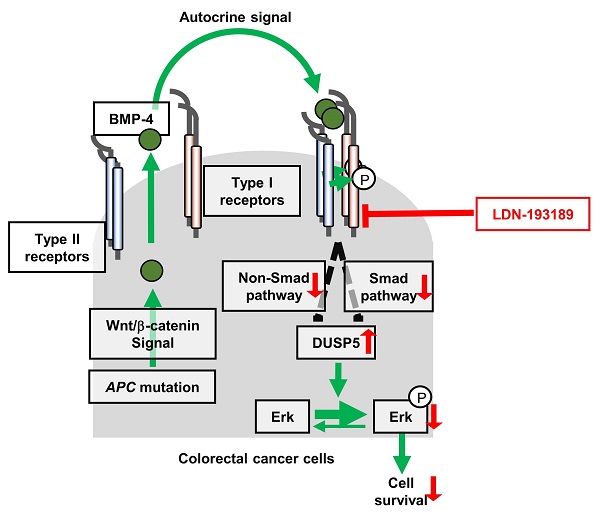Exploring new treatments targeting colorectal cancer Crucial signaling pathway for cancer cell survival identified


Molecularly targeted therapy with BMP inhibitors reduces colorectal cancer formation
In colorectal cancer cells, aberrant activation of the Wnt/β-catenin pathway induces BMP4 transcription, which in turn activates BMP signaling. The signaling promotes addition of phosphate groups to an enzyme called Erk by suppressing DUSP5, an enzyme that catalyzes the removal of phosphate groups, which results in the survival of cancer cells. BMP inhibitors, including LDN-193189, inhibit BMP signaling originating in cells. This results in dephosphorylation of Erk through elevation of DUSP5, which in turn induces apoptosis of cancer cells.
© 2017 Kohei Miyazono.
A University of Tokyo research team revealed for the first time that colorectal cancer cells activate the intracellular signaling of a protein called BMP-4 that enables the cells to evade apoptosis, or programmed cell death. The team further found that inhibition of BMP signaling prevented the formation of colorectal tumors, thereby demonstrating that administering BMP inhibitors may be an effective treatment for curing colorectal cancer.
Colorectal cancer is the third most common form of cancer responsible for the fourth largest number of cancer deaths worldwide. Surgical removal of cancer tissues has proved effective in treating patients with early stages of the disease; those with advanced-stage cancer often receive a regimen of chemotherapy and molecularly targeted therapy, but their five-year survival rate remains low, especially in patients with metastatic lesions. The molecular mechanisms responsible for the progression of colorectal cancer, including mutations in the tumor suppressor gene APC from early stages of the disease, have been uncovered. The mutations in APC cause the aberrant activation of a cellular signaling system, Wnt/β-catenin, which in turn enhances tumor formation in the colon. Understanding and targeting these molecular mechanisms are considered important strategies for improving patient outcomes.
In the current study, the research team led by Project Associate Professor Shogo Ehata and Professor Kohei Miyazono at the University of Tokyo’s Graduate School of Medicine investigated the role of signaling by BMP—a group of proteins known as cytokines that are released by cells and involved in various bioactivities—in colorectal cancer progression. By analyzing surgical specimens and cell lines, the team demonstrated that the Wnt/β-catenin pathway universally activates BMP-4 expression, resulting in self-stimulating (autocrine) BMP signaling. Notably, the researchers showed that suppressing BMP-4 expression induced apoptosis, which inhibited the proliferation of colorectal cancer cells, indicating that BMP inhibitors may be effective agents for treating colorectal cancer. Based on these results, the group tested the antitumor effect of LDN-193189, a BMP receptor inhibitor, and found that it induced apoptosis of colorectal cancer cells. Moreover, LDN-193189 inhibited the formation of tumors in mice bearing human colorectal cancer cells.
These findings suggest that BMP-4 activates an important signaling pathway for the survival of colorectal cancer cells, and targeting this pathway with BMP inhibitors, such as LDN-193189, points toward an attractive new therapeutic strategy, which can provide patients with more choices for treating colorectal cancer effectively.
"Although experts still disagree on the role of BMP signaling in cancer progression, I find it amazing that increased expression of BMP-4 if found consistently when observing colorectal cancer," says Ehata. Miyazono adds, "BMP inhibitors may become highly efficient agents for colorectal cancer treatment in the future."
Paper
, "Autocrine BMP-4 signaling is a therapeutic target in colorectal cancer", Cancer Research Online Edition: 2017/08/01 (Japan time), doi: 10.1158/0008-5472.CAN-17-0112.
Article link (Publication)
Links
Department of Pathology, Immunology and Microbiology, Graduate School of Medicine (Japanese)
Department of Molecular Pathology, Graduate School of Medicine






